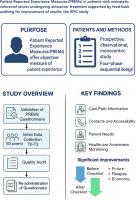Patient-Reported Experience Measures (PREMs) in patients with metastatic colorectal cancer undergoing treatment supported by feedback auditing: the EPIC study
引用次数: 0
Abstract
Background
Patient-reported experience measures (PREMs) offer an objective measure of the patient experience by investigating various fields of the care pathway. We analyzed PREMs in patients with metastatic colorectal cancer (mCRC) undergoing anticancer therapy integrating an auditing process to allow corrective actions.
Materials and methods
This is a prospective, observational, monocentric study with a four-phase sequential design: phase I validation of the PREMs questionnaires in five-level Likert item format in Italian; phase II administration of questionnaires at T0 (0-30 days since the start of oncology care), T1 (30 days-6 months), T2 (6-12 months), T3 (>12 months); phase III analysis of results during quality audits and implementation of strategies to improve care pathways; phase IV re-administration and results compared with phase II.
Results
PREMs were tested for validity in 47 patients (phase I of the EPIC study). In phase II, 102 patients were enrolled, 150 questionnaires were administered and 142 returned (94.6%). Sixteen questions grouped in four areas (information about care path, contacts and accessibility, patient needs, health care awareness monitoring) were analyzed. A high proportion of patients were concerned about their future/possibility of relapse at T1 (61.6%/58.3%) and T2 (62.5%/63.7%). After the implementation of a checklist for clinicians (phase III), in phase IV, 74 patients were enrolled and the proportion of patients concerned about their future/possibility of a relapse decreased at T1 (35.7%/25%) and T2 (31.3%/43.4%).
Conclusions
PREMs evaluation is feasible in the setting of mCRC. A checklist for clinicians tailored after an ad hoc audit improved results about patients’ concerns about their future and possibility of relapse.

接受反馈审计支持治疗的转移性结直肠癌患者的患者报告体验测量(PREMs): EPIC研究
背景:患者报告体验测量(PREMs)通过调查护理途径的各个领域,提供了对患者体验的客观测量。我们分析了接受抗癌治疗的转移性结直肠癌(mCRC)患者的prem,并整合了审计过程以允许纠正措施。材料和方法这是一项前瞻性、观察性、单中心研究,采用四阶段顺序设计:第一阶段验证PREMs问卷的五水平Likert项目格式;II期在T0(肿瘤治疗开始后0-30天)、T1(30天-6个月)、T2(6-12个月)、T3(12个月)进行问卷调查;在质量审计和实施改善护理途径的战略期间对结果进行第三阶段分析;IV期再给药及与II期比较的结果。结果在47例患者(EPIC研究的I期)中对sprems进行了有效性测试。在II期,102名患者入组,150份问卷调查,142份(94.6%)返回。分析了分为四个领域的16个问题(关于护理路径、接触和可及性、患者需求、卫生保健意识监测的信息)。较高比例的患者在T1(61.6%/58.3%)和T2(62.5%/63.7%)时担心自己的未来/复发的可能性。在实施临床医生检查表(III期)后,在IV期,74名患者入组,T1和T2时关注其未来/复发可能性的患者比例分别下降(35.7%/25%)和31.3%/43.4%)。结论sprems评价在mCRC环境下是可行的。经过特别审核后,为临床医生量身定制的检查表改善了患者对其未来和复发可能性的担忧。
本文章由计算机程序翻译,如有差异,请以英文原文为准。
求助全文
约1分钟内获得全文
求助全文

 求助内容:
求助内容: 应助结果提醒方式:
应助结果提醒方式:


